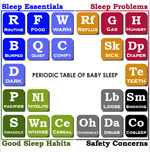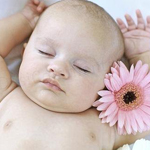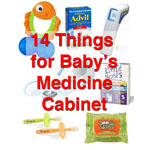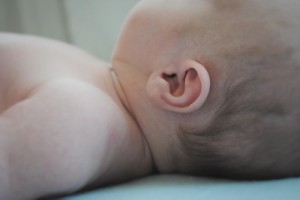 Baby ear infections are one of the most frequent ailments to affect newborns, second only to the common cold. In this article we’ll talk about the signs and symptoms of ear infections, the treatment options, and how to prevent them.
Baby ear infections are one of the most frequent ailments to affect newborns, second only to the common cold. In this article we’ll talk about the signs and symptoms of ear infections, the treatment options, and how to prevent them.
Ear Infection Signs and Symptoms
An ear infection is often hard to diagnose as a parent, but you’ll probably be aware that something is wrong. Look for these symptoms:
- Changes in mood, tending toward fussiness. These tend to be dramatic and last throughout the day.
- Flu-like symptoms including runny nose, cough, and/or congestion.
- Fever defined as a temperature of 100.3 or above, ideally taken using an accurate digital thermometer.
- Apparent discomfort when nursing, drinking bottles, eating, or sucking on a pacifier.
- Reaching toward, touching, or pulling on ears (his own, not yours).
- Pus or strange odors emanating from the ear (less common).
How to Tell if Your Baby Has An Ear Infection
If you suspect that your child has an ear infection, the best thing is to take him or her to the pediatrician. Your doctor will use and otoscope to look inside your baby’s ears and make the diagnosis. Anyone can buy an otoscope for home use on Amazon for about $30, though one would need training to use one safely (especially on an infant). I’m not suggesting that non-medical-professionals go out an buy one and learn what an ear infection looks like, but hey, it’s a free country.
There is a surprisingly simple way to check for an ear infection: face your baby when he’s somewhat happy (not crying or screaming) and grab both of his ears with your hands. Gently, now! A healthy baby won’t be bothered by this, whereas a baby with tender ears due to an infection will undoubtedly scream. I just tried this myself on my son who we suspected had an ear infection. He took it quite well and seemed rather amused; it turned out that he’s got about 4 teeth coming in which seems to be the cause of the symptoms. If we do come to find out that he’s got an ear infection, I’ll come back and edit this article.
Treatment for Baby Ear Infections
The best thing you can do is take your baby in to see the doctor. Some ear infections will go away on their own, but usually your pediatrician will prescribe an antibiotic to help it clear up. If your baby has persistent ear infections, or one that doesn’t seem to go away, your doctor may discuss a surgical option: the insertion of tubes into your baby’s ears canals to mitigate infections. This form of treatment is actually quite common; I know several people who have had their ears “tubed” or done so for the children, and I hear nothing but good things. Again, discuss with your doctor.
If it’s the middle of the night, all you can hope to do is make your baby comfortable. Don’t force the bottle or pacifier, as these may cause discomfort. You may think about offering some Baby Tylenol to help make your infant more comfortable. Also, try to keep your baby hydrated: offer breast milk or formula frequently, even if it’s refused.
Preventing Future Ear Infections
From my own non-medical experience (as a parent) and from reading up on this topic, I can offer some suggestions to help you prevent future ear infections for your baby. This is, after all, an infection, and it often occurs when your baby has a cold. Thus, my tips are themed around becoming a germophobe:
- Keep anyone who’s sick, has been sick, or might be sick away from your baby.
- Ask people to wash their hands before playing with, holding, or feeding your baby.
- Wash your own hands, especially after coming home from work, in from outside, etc.
- Be aware that little kids are walking germ factories. They pick it up at school or day care, they bring it home, and they just don’t know any better.
- Have hand sanitizer within reach at all times, especially while out in public, and use it liberally.
- Anything that your baby touches will be on his finger and then in his mouth within ten seconds. Remember that.
- Keep people who smoke away from your baby, his room, and his things. This is a major risk factor for ear infections and a host of other problems.
Some of these may seem a bit harsh – you might feel uncomfortable asking your mother-in-law to wash her hands before picking up her grandchild. But do it anyway, as politely and apologetically as possible, for your baby’s sake. Sometimes people don’t realize that in the past five minutes they’ve touched a car door handle, a public doorknob, and their own face/mouth/hair, but they want to scoop that cute baby right up. Worst case scenario, you can always rub your baby down with hand sanitizer as soon as it’s polite to do so.
Make sure you stock up with everything you need to head off a major cold before it gets going. See our list of 14 things for baby’s medicine cabinet for some suggestions.
Stay healthy, and good luck!
What To Read Next
If you like this article, you might want to subscribe by e-mail or RSS so that you’re notified when new content is posted.
 |
 |
 |
 |
| Baby sleep problems takes you through the most common sleep issues and how to address them. | The periodic table of baby sleep has all the essential elements for healthy baby sleep habits. | Visit our sleep training section for strategies and tips for teaching your baby to sleep through the night. | With cold and flu season approaching, here are 14 things for baby’s medicine cabinet. |

